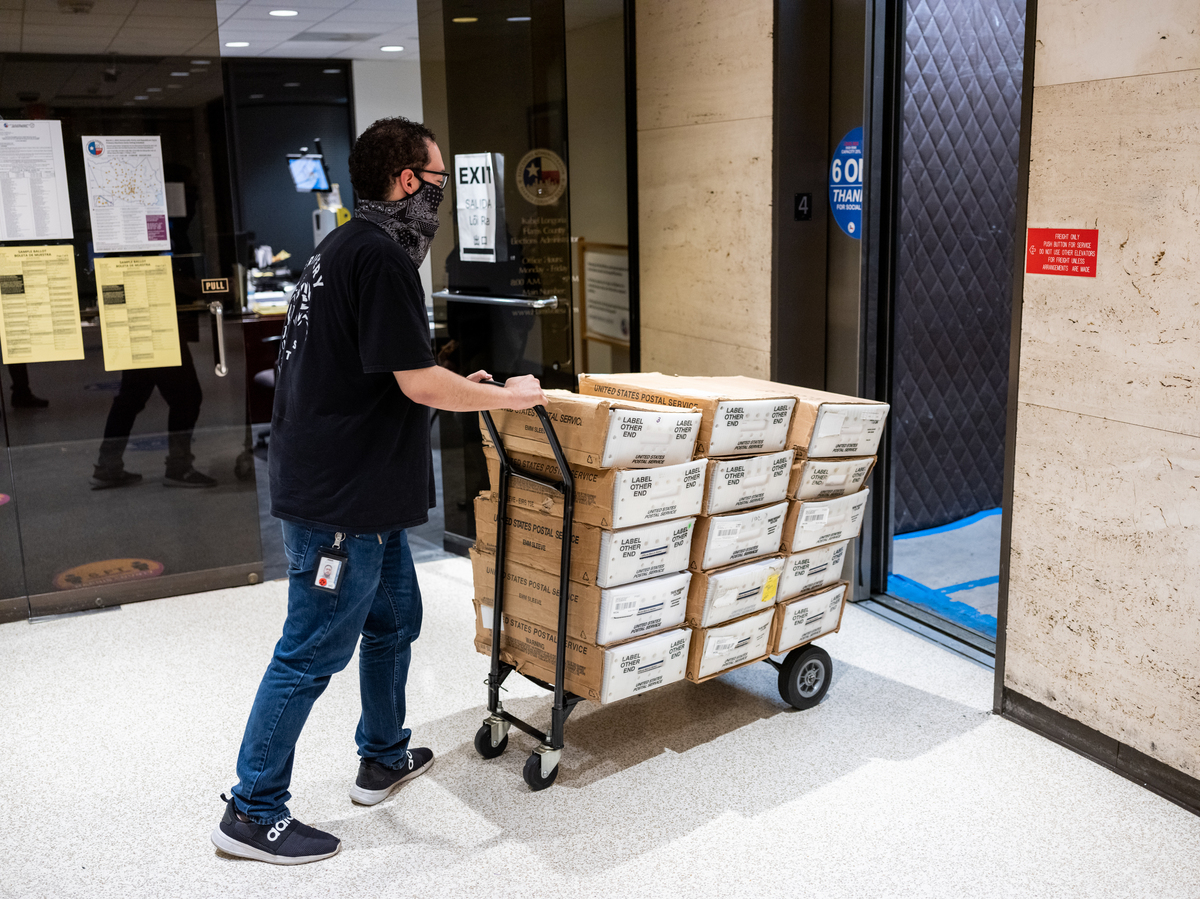12.38% of Texas mail ballots had been rejected in March number one : NPR


In February, forward of the Texas statewide number one, Carlos Vanegas on the Harris County Elections Administrative center in Houston pushes a cart with mail-in ballots to be despatched to citizens. The county in the long run rejected 1000’s of the mail ballots it won again.
Scott Dalton for NPR
cover caption
toggle caption
Scott Dalton for NPR

In February, forward of the Texas statewide number one, Carlos Vanegas on the Harris County Elections Administrative center in Houston pushes a cart with mail-in ballots to be despatched to citizens. The county in the long run rejected 1000’s of the mail ballots it won again.
Scott Dalton for NPR
A complete of 24,636 mail-in ballots had been rejected during Texas within the March 1 number one election, the Texas secretary of state’s administrative center stated Wednesday.
That is a 12.38% rejection price — some distance upper than in earlier contests.
Native election officers, in addition to vote casting rights advocates, have stated many citizens had been tripped up via a GOP-backed regulation that went into impact overdue final yr.
James Slattery, a senior state legal professional on the Texas Civil Rights Challenge, says those ultimate figures display Texas’ new vote casting regulation, referred to as Senate Invoice 1, was once “catastrophic for democracy” within the state.
“The rejection price went up via an element of 12 for the reason that final election,” he stated. “The one explanation why that the rejection price soared this top is that Senate Invoice 1 imposed this new ID requirement and it’s disenfranchising eligible citizens.”
Below SB 1, citizens have to supply a partial Social Safety quantity or driving force’s license quantity on their mail poll utility — in addition to at the go back envelope. The ID quantity they supply has to compare what is on their voter registration report.
Many citizens both utterly ignored the brand new ID portion of the go back envelope or had mismatched IDs, native officers stated.
Some county election officers reported that as much as 40% of ballots that had been returned had been to start with flagged for rejection. In the end some citizens had been ready to mend their ballots, however many citizens weren’t.
Officers in Harris County — house to Houston, and the state’s maximum populous county — had stated they in the long run rejected 19% of the mail-in ballots they won.

Consistent with state knowledge, there was once a quite upper ultimate rejection price amongst ballots forged within the Democratic number one when compared with the Republican number one.
The Texas secretary of state’s administrative center reported 12.87% of Democratic mail-in ballots forged had been rejected throughout the main, whilst 11.77% of Republican ballots had been rejected. A complete of 14,281 Democratic ballots had been rejected, and 10,355 Republican ballots had been rejected.
Sam Taylor, assistant secretary of state for communications, stated in a commentary final month that many of those problems will also be addressed via voter training.
“Whilst in years previous we’ve got targeted our voter training efforts on in-person ID necessities,” he stated, “this yr we also are devoting a good portion of our voter training marketing campaign to improving consciousness of the brand new mail-in poll ID necessities.”
Slattery stated he’s skeptical that can be sufficient to handle the problems created via SB 1.
“Extra voter training will lend a hand on the margins,” Slattery stated. “But it surely does no longer give an explanation for a 12-factor soar in rejections. It’s inherent within the nature of the method.”
Slattery stated he’s “very nervous” rejection charges will “most effective be worse in November” for the overall election, when extra citizens are anticipated to forged mail-in ballots.

#Texas #mail #ballots #rejected #March #number one #NPR



